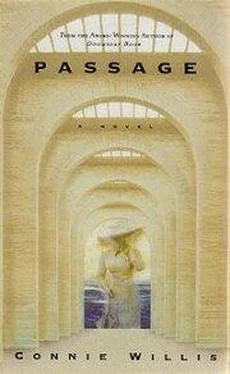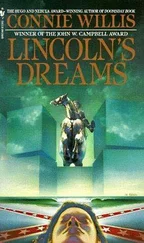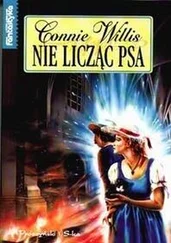“I can’t,” she said with an anxious glance at her watch. “The Eldercare person can only stay until four. I’ll come get them tomorrow morning. Will ten work?”
“Sure,” he said.
“I’ll see you then,” she said and hurried toward the elevator.
“And I’ve got to get back to the ER,” Vielle said. “I’ll call you if I find anybody else who saw Joanna.”
She started for the stairs. Halfway there, she stopped, said, “Damn!” and came back toward Richard.
“What’s the matter?” he said.
“I keep forgetting I can’t get there from here,” she said, exasperated. “They’re painting the whole first floor. It’s completely blocked off.” She walked past him and headed for the elevator. “I’ve got to go up to second and take the service elevator down.”
And that was exactly the problem, he thought, looking after her. Half the hospital’s stairs and walkways were blocked off at any given time, and even when they weren’t, it was nearly impossible to get from one part of Mercy General to another. And Joanna had had Mandrake on her tail. She might have ducked into an elevator or down a hall to avoid him, or taken a shortcut to avoid a blocked-off walkway. Which meant her having been seen on three-west didn’t mean a thing. Unless we’ve got a map of Mercy General, and not just a map. A map of Mercy General that day. Which meant talking to Maintenance.
He went down to the basement and talked to a man named Podell, who clearly thought Richard was there to complain about something and who eventually reluctantly produced a work schedule. “They may not have been painting those when it says, though,” he said helpfully.
But it was a start. Richard copied the schedule down and stuck it in his pocket. “Do you have a map?”
Podell stared incredulously at him. “Of Mercy General?”
Richard settled for asking Podell the quickest way to get up to three-west, and carefully writing his instructions down, then going up to Medicine to see Mrs. Davenport. She wasn’t there—she was out having a CAT scan. Richard asked how long she would be and then how to get to eighth, writing those instructions down, too, and drawing the beginnings of a rudimentary map of the halls and elevators as he went.
He did the same thing on eighth, opening doors to various linen closets and storage rooms, and when he found a stairway, following it as far down as it would go. By the time he went back to the lab, the paper was a maze of crisscrossing lines and squares. He put them on the computer, sketching in floors and the walkways, marking the routes he’d taken and the ones he knew, and outlining the sections he needed to fill in.
All of which was an elaborate form of stalling, so he wouldn’t have to go into Joanna’s office and get the transcripts. But Kit would be there in the morning to pick them up, and it had to be done sooner or later. He got the keys, and went down to her office.
He hadn’t been in it since she died. He stood outside, bracing himself, for several minutes, before he unlocked the door and went in. Her computer was still on. Books and stacks of transcripts were heaped on either side of it, with a shoe box full of tumbled tapes on top. Joanna’s minirecorder lay next to it, the tape bay open as if she had just popped a tape out. The message light on her answering machine was flashing.
It was impossible not to imagine, looking at the office, that she had not simply stepped out for a second. That she would not be right back, appearing in the doorway, breathless, saying, “I’m sorry I’m late. Did you get my message?”
But the messages on the machine were a week old, the plant on top of the file cabinet was withered and brown, and he would have to figure out the message himself. Unless whomever she’d gone to see had called her, and she’d listened to the message and then not erased it. He went over to the answering machine and stood there, his finger poised above the “play” button, bracing himself for the sound of her voice. But her voice wouldn’t be on it, only the voices of the people leaving the messages and, he hoped, a clue. He hit “play.”
Mr. Mandrake with a long tirade about Joanna never returning his calls. Mr. Wojakowski. Mrs. Haighton’s housekeeper, relaying the message that Mrs. Haighton couldn’t come Wednesday, she had a PEO meeting and would have to reschedule. Mr. Mandrake again, trying to convince her to go see Mrs. Davenport, who had “overwhelming proof of psychic powers she was granted by the Angel of—machine full. No more messages can be recorded.”
He called the hospital switchboard. All pages were confidential, the operator told him, which under other circumstances would have struck him as funny, and, anyway, no permanent record was kept of the pages.
He hung up and started through the transcripts piled on the desk.
Phrases and words were highlighted in yellow. “I felt happy and peaceful,” a Mr. Sanderson had said, “as though I had come to the end of a long voyage and was finally home.” The word “voyage” was highlighted, and elsewhere in the transcript, “water” and “cold,” which both made sense, and “glory,” which didn’t. In the next transcript, “cold” was highlighted again, and “passage” and “a sound like something ripping.” In the next, “darkness” and “smoke” and one entire sentence: “I was standing at the bottom of a beautiful stairway going up as far as I could see, and I knew it led to heaven.”
Or the Boat Deck, Richard thought. Joanna had clearly been pursuing a connection with the Titanic. Every word and phrase she’d marked, with the exception’ of “glory,” was Titanic -related. And “smoke.” No, “smoke” could relate to possible fires on the Titanic. Had she seen one? But she hadn’t mentioned a fire in any of her accounts. Or had she? The last two times she’d gone under he’d scarcely listened to her accounts, he’d been so wrapped up in why she’d kicked out. Could there be something in one of them that had triggered the discovery, whatever it was? And made her go tearing off in such a hurry that she’d left the computer on and forgotten her minirecorder?
But she’d had her last session four days before she died. And gone tearing off somewhere in a taxi, looking upset, had showed up at Kit’s an hour later without her coat and then left abruptly.
That’s it, he thought, there was something in that NDE, and began going through the stack of transcripts, looking for Joanna’s. They weren’t there, and when he called up her files, neither of her last two accounts were on it. They must still be on the tapes.
He started sorting through them, but a third of them weren’t labeled, and those that were, were in some kind of code. He would have to take them home and play them. He dumped all the tapes back into the shoe box and carried them, Joanna’s minirecorder, and the computer disks down to the lab and then went back for the transcripts.
It took him two trips. He debated taking the plant, but it looked too far gone to be saved. He shut and locked the door, carried the transcripts down to the lab, stacked them on the examining table, and started down to see Mrs. Davenport. Halfway to the elevator, he turned around, walked back to the lab for a beaker of water, and went back to Joanna’s office to water the plant.
“Yes, lost.”
—Sholom Aleichem, after the last card game he played on his deathbed, on being told he lost
The first-class smoking room,” Mr. Briarley said and led Joanna into a wide, red-carpeted room. It was paneled in dark wood, with deep red leather chairs. At the far end, near a blazing fireplace, sat a group of people around a table, playing cards.
Читать дальше












